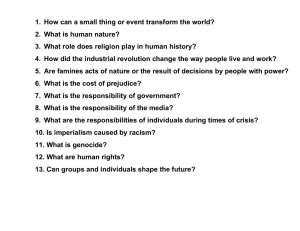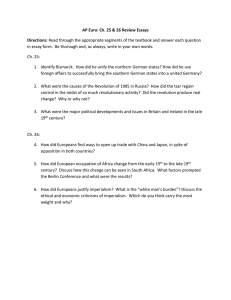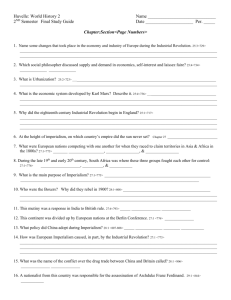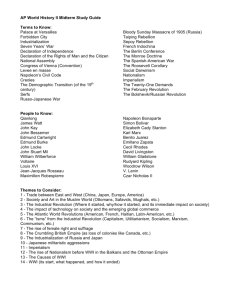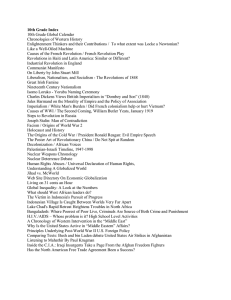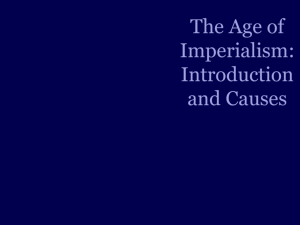Industrialization and Imperialism Scramble Where did the Industrial Revolution start? England
advertisement
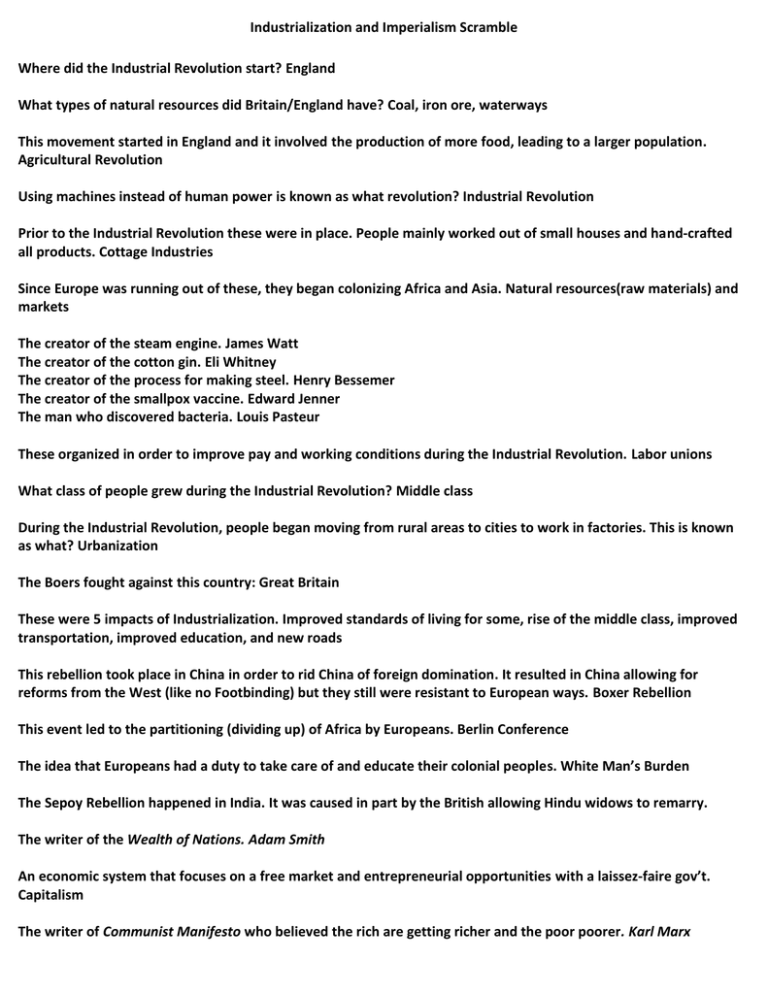
Industrialization and Imperialism Scramble Where did the Industrial Revolution start? England What types of natural resources did Britain/England have? Coal, iron ore, waterways This movement started in England and it involved the production of more food, leading to a larger population. Agricultural Revolution Using machines instead of human power is known as what revolution? Industrial Revolution Prior to the Industrial Revolution these were in place. People mainly worked out of small houses and hand-crafted all products. Cottage Industries Since Europe was running out of these, they began colonizing Africa and Asia. Natural resources(raw materials) and markets The creator of the steam engine. James Watt The creator of the cotton gin. Eli Whitney The creator of the process for making steel. Henry Bessemer The creator of the smallpox vaccine. Edward Jenner The man who discovered bacteria. Louis Pasteur These organized in order to improve pay and working conditions during the Industrial Revolution. Labor unions What class of people grew during the Industrial Revolution? Middle class During the Industrial Revolution, people began moving from rural areas to cities to work in factories. This is known as what? Urbanization The Boers fought against this country: Great Britain These were 5 impacts of Industrialization. Improved standards of living for some, rise of the middle class, improved transportation, improved education, and new roads This rebellion took place in China in order to rid China of foreign domination. It resulted in China allowing for reforms from the West (like no Footbinding) but they still were resistant to European ways. Boxer Rebellion This event led to the partitioning (dividing up) of Africa by Europeans. Berlin Conference The idea that Europeans had a duty to take care of and educate their colonial peoples. White Man’s Burden The Sepoy Rebellion happened in India. It was caused in part by the British allowing Hindu widows to remarry. The writer of the Wealth of Nations. Adam Smith An economic system that focuses on a free market and entrepreneurial opportunities with a laissez-faire gov’t. Capitalism The writer of Communist Manifesto who believed the rich are getting richer and the poor poorer. Karl Marx An economic system formed as an alternative to capitalism. It focuses on redistributing wealth so that all people are equal. Communism A stronger country taking over a weaker country politically, economically, and socially is known as Imperialism. 4 motives of European Imperialism. National pride, racism, economic competition, missionaries The 2 continents that European imperialists focused on. Asia and Africa 3 inventions that allowed Europeans to take over Asia and Africa more easily. Maxim gun, Steam Engine, Railroads An area completely controlled by an outside nation. Colony A form of Imperialism where local leaders were left in charge but Europeans told them what to do. Protectorate An area in which an outside power claimed exclusive investment or trading privileges. Sphere of Influence This country opened up Japan to trade through treaties. United States China(country) is an example of spheres of influence (meaning European countries controlled their trading networks). China was resistant to opening up to European ways, but they had to because of internal problems. Japan opened up because of America, and once they did, they adopted Europe’s central government, Britain’s naval power, and America’s education system. They also participated in Imperialism by taking over Korea. This was built in Egypt and paid for by Britain. It allowed people to take a shortcut between Asia and Europe. Suez Canal Opium addiction and internal problems caused China to open up. Three technologies that led to the Agricultural Revolution. Seed Drill, Crop Rotation, Enclosure Movement These two religions in India made it harder for Indians to unite against Britain. Hinduism and Islam(Mughal) Five positives and Negatives of Imperialism: New Roads, New Hospitals, New Schools, New Diseases, New Telephone Wires, Traditional Cultures were destroyed, Lost land and independence
